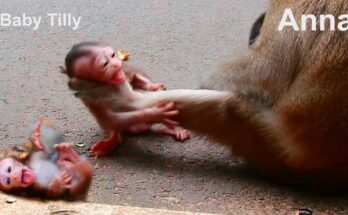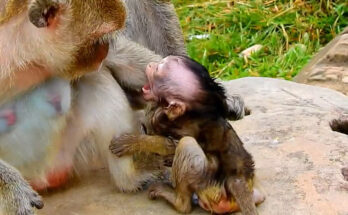
In the dense jungle, where the canopy shelters a whole world of life, one tiny baby monkey sits alone, eyes wide with sadness and confusion. His small body trembles slightly as he looks around for the warmth and comfort of his mother—but she remains distant, uninterested, even cold. She doesn’t groom him or let him nurse. When he tries to cling to her, she shrugs him off harshly. Her eyes don’t hold the softness a mother’s gaze should have.
Many who witness this behavior can’t help but wonder: Is this truly his mother? Or is she a stepmother monkey, left to care for a baby that isn’t her own?
In primate groups, adoption or care by other females is not unheard of, but sometimes, if the mother passes or abandons her baby, another female might take over reluctantly. The bond, however, isn’t always the same. While a true mother would nurture and defend her infant fiercely, a stepmother may lack the same natural instinct and emotional connection, leading to neglect or even aggression.
The baby monkey’s cries are heartbreaking. His tiny arms stretch out as he tries to follow the adult female, but she keeps walking, paying him little attention. The rest of the troop seems indifferent too, focused on their daily routines. No one steps in to offer care.
Whether she is his real mother, suffering from stress or illness, or a stepmother who simply doesn’t accept him, the result is the same: the baby is left without the love and warmth he desperately needs. And in the wild, that absence can mean more than loneliness—it can mean survival itself is at risk.
Nature can be both beautiful and cruel, and this baby monkey’s story is a painful reminder of that harsh truth.


